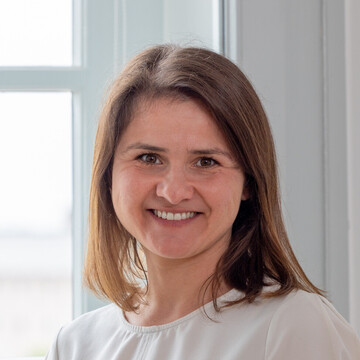
Prof. Dr. Dominika Wruk
Dominika Wruk ist Assistant Professor for Sustainable Entrepreneurship. She has been leading the BMPF-funded interdisciplinary junior research group platforms2share since June 2017. The group explores the potential of cooperative models and new technologies as well as their contributions to the Platform Economy. Dominika Wruk is also part of the i-share network studying organizational models in the Sharing Economy and their social, ecological and economic effects.
Another one of Ms. Wruk´s fields of research is the emergence and the diffusion of modern management concepts and practices. She works both theoretically and empirically and investigates the way new ideas and concepts emerge, find their way into organizations and are applied and combined in an organizational context. She wrote her dissertation within the scope of a DFG-funded project on the diffusion and adoption of management concepts.
Dominika Wruk studied business administration at the University of Mannheim and the Ecole de Management in Bordeaux, France and received her doctoral degree from the University of Mannheim. She has worked as a researcher and the Institute for SME Research and Entrepreneurship at the University of Mannheim since June 2008. She spent three months as visiting scholar at Stantford University in autumn 2011.
Research Interests
- Sharing Economy and Platform Economy
- Sustainable Entrepreneurship, sustainable organizational forms
- Emergence and diffusion of management concepts and organizational forms
- Organizatoin theories, in particular neo-institutional theory
Publications
- Zielinski, F., Mildenberger, G., Rabadjieva, M., Sauerbier, E., Terstriep, J. and Wruk, D. (2024). Was sind soziale Innovationen und wie lassen sich ihre Impacts messen? Konzeptionelle Grundlagen für innovationsfeldspezifische Wirkmodelle. Heidelberg: Universität Heidelberg.
- Wruk, D. and Oberg, A. (2022). Wirkungen der Sharing Economy in Deutschland. i-share Report, 3. Mannheim.
- Schöllhorn, T., Wruk, D. and Oberg, A. (2020). How fields overlap: An exploratory study of relational and symbolic connections between three fields. 16th New Institutionalism in Organization Theory Workshop, Odense, Denmark.
- Schöllhorn, T., Wruk, D. and Oberg, A. (2020). How fields overlap: An exploratory study of relational and symbolic connections between three fields. 36th EGOS – European Group of Organizational Studies Colloquium, Hamburg, Germany.
- Vith, S., Oberg, A., Berwing, S., Höllerer, M. A. and Wruk, D. (2020). Sociocultural meaning, urban space, and the formation of the sharing economy. 16th New Institutionalism in Organization Theory Workshop, Odense, Denmark.
- Vith, S., Oberg, A., Berwing, S., Höllerer, M. A. and Wruk, D. (2020). Sociocultural meaning, urban space, and the formation of the sharing economy. 36th EGOS – European Group of Organizational Studies Colloquium, Hamburg, Germany.
- Krlev, G., Wruk, D., Pasi, G. and Bernhard, M. (eds.) (2023). Social economy science : transforming the economy and making society more resilient. Oxford: Oxford University Press.
- Krlev, G., Wruk, D., Pasi, G. and Bernhard, M. (2023). Social economy: Between common identity and accelerating social change. In Social economy science : transforming the economy and making society more resilient (S. 37–68). Oxford: Oxford University Press.
- Oberg, A., Wruk, D. and Friedrich-Schieback, M. (2022). Das i-share Wirkungsmodell. In Wirkungen der Sharing Economy in Deutschland (S. 9–17). Mannheim: .
- Wruk, D., Schöllhorn, T. and Oberg, A. (2020). Is the sharing economy a field? How a disruptive field nurtures sharing economy organizations. In Theorizing the sharing economy : variety and trajectories of new forms of organizing (S. 131–162). Bingley [u. a.]: Emerald Publishing.